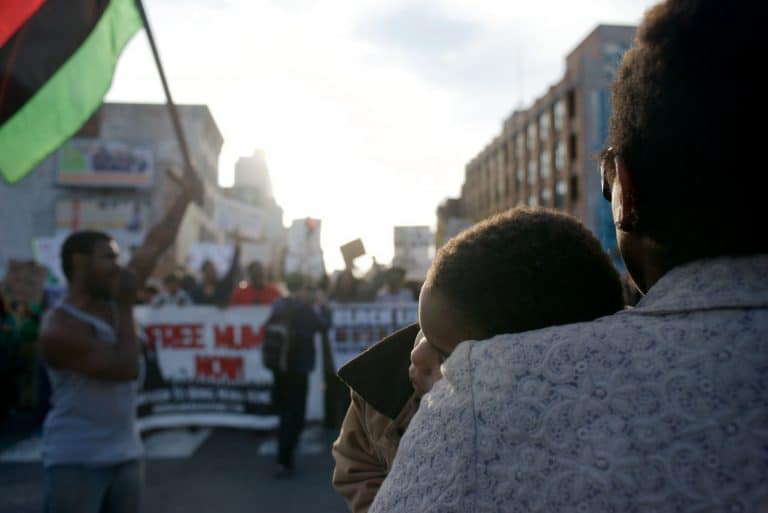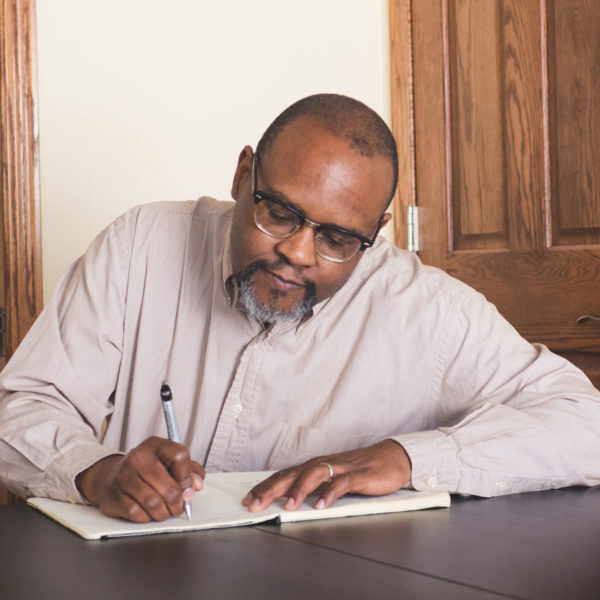
Image by Bastiaan Slabbers/Getty Images, © All Rights Reserved.
In Defense of Backtalk
My first lessons in challenging dominant narratives came at the hands, literally, of my Black Latina mother.
Though she and my father encouraged their children to read and think for themselves in the shifting cultural landscape of the 1960s and early 1970s, as a woman often left alone with five black boys on her hands (my father was in the Army), my mother had her limits. Whether the subject involved whose turn it was to do the dishes or mow the lawn, her conviction that being properly dressed always involved wearing an undershirt no matter the weather, her need to be early for Catholic Mass, or her views on the shortcomings of both Black Vernacular English and my father’s handling of money, at some point my mother’s tolerance for the discussion ended. Any comments from us beyond that point constituted “backtalk,” and could elicit consequences ranging from a harsh dressing down to some licks with The Belt.
This swift — and I thought arbitrary — shift from conversational to command-and-comply mode always bothered me, though I learned, of course, to adjust on cue. But I never outgrew my propensity for backtalk, or my sense that it serves a legitimate purpose. It’s no accident I eventually studied and taught writing and rhetoric. My experiences with my mother —and, full disclosure, my own behavior as a parent — taught me that criticism of backtalk has less to do with respect and more to do with the more powerful not wanting to listen to what those with less power have to say.
Of course, in public discourse, critics of backtalk never frame it that way. They invariably use terms such as “politeness” or “reason” or “respect” to characterize what they object to when individuals directly — or activists or protesters from a distance — challenge their entrenched beliefs, attitudes, and practices.
“They’re too emotional,” such critics will say.
“People will respond to logic and reason,” they contend.
“Those protests are too disruptive or disrespectful or confrontational or impolite,” they conclude.
When the powerful and privileged insist on politeness as the prerequisite for listening, they gain two advantages: First, they shift the conversations from the content of an issue — the morality of the subject — to one about the forms being used to advance that conversation. Second, the marginalized don’t decide what tone is too forceful; the tastes of the poor don’t determine what’s profane and what’s acceptable. No, the weak never get to dictate terms to the strong. Our models of appropriateness come from those with power: the educated, the privileged, and those emulating them.
Because of this, calls for politeness, respect, and reason also can be used to assert differences in power while simultaneously being presented as neutral. In fact, you can find no clearer marker of authority than who gets to yell at whom — a power gap so strong that the simple knowledge of its existence generally makes the yelling unnecessary.
Think of the times you’ve heard someone say, “Don’t take that tone with me” in a situation, for example, where a parent addresses a child, or a customer berates a sales clerk. If politeness itself were neutral, if it were truly only about mutual respect, we’d be equally likely to hear it invoked in the opposite power dynamic. But how often have you heard a student say to a teacher, a player say to a coach, a child to a parent, or an employee to an employer, “Don’t take that tone with me”?
Invocations of politeness also assume that what counts as polite interaction stays consistent across class, gender, racial, or geographic barriers. It doesn’t. If it did, all those handbooks and advice columns about how to speak, walk, dress would be superfluous.
I learned from living and traveling in places as far-flung as North Carolina, Arizona, and Minnesota, that one region’s rudeness is another’s warmth and friendliness; one community’s version of respect is coldness in another. In certain places, people who ask “How are you doing?” expect nothing less than a soliloquy in return; in other places, any response beyond, “Fine. And you?” is TMI.
No doubt the tenor of public discourse has changed. I lived through that shift during the rise of more casual speech and dress from the 1960s onward. Part of this happened as people reacted against the use of polite, bureaucratic, reasoned, and academic language to cover lies about war, injustice, and economic inequity. Part of it happened as Black, Latino, and other subcultures gained more access to mainstream cultural platforms in film, television, literature, and music. And we’ve turned public discourse exponentially looser with the rise of social media, where points of view are rarely presented in the smooth tones of a William F. Buckley-James Baldwin back and forth.
Sometimes it sounds like cacophony; sometimes it shouts; sometimes it interrupts; sometimes it shocks the listeners. Sometimes it’s called the “coarsening” of discourse. But much of what jars the mainstream really amounts to a wider variety of people speaking for ourselves.
The conversations so often called “polite” and “reasoned” — ones historically dominated by the privileged about the marginalized — are now being challenged by the marginalized. And as with the backtalk that could get us into deep trouble as kids, too often our so-called reasonable listeners pay more attention to how we tell our truth than to the urgency of the truth we tell.
But no discussion about marginalized people can talk over us and still call itself a dialogue, however smooth and calm its tenor. Whatever this shift in tone loses in comfort, it gains in authenticity, depth, honesty, and legitimacy. For that very reason, the backtalk of the marginalized has taken hold. And it will take more than a moralizing metaphorical back-of-the-hand or whipping belt to silence it.
Because there are some truths that we needed to tell our parents — and which my children have needed to tell me — that can’t be said politely because they aren’t polite truths. They will upset the listener not because they’re disrespectful, irrational, or impolite, but because they challenge that listener’s self-image.
We should remember that the accusations against sexual predator Larry Nasser began as backtalk, and were silenced as such. So was what has now become #MeToo. LGBT advocacy and Black Lives Matter and the Autistic Self Advocacy Network and #CripTheVote are backtalk.
I became a writer in part because — having been punished for backtalk by my family and the wider world — I realized the power of expressing a real, urgent, visceral, and previously unexpressed truth in the form most meaningful to the speaker. Hearing those truths from people whose experiences I had never remotely comprehended before — hearing them talk back to me — is one of the most profound gifts I’ve ever received. And all I have to do to earn it is quiet the tone policeman in my head and listen.
